- A Glimpse Into the 2026 Arakan State Parliament
- Junta airstrikes target military outposts seized by Arakan Army in Arakan State
- Motorbike spare part prices skyrocket in Arakan State amid tighter traffic rules
- Kyauktaw IDP camps struggle with inadequate latrines
- Religious freedom, interfaith harmony expand in areas controlled by AA in Arakan State
Nearly Eight Months On, the Battle for Arakan Rages On
Despite the AA’s military victories, the state has suffered serious damage as the regime has deliberately targeted residential areas as it has done in other parts of the country.
25 Jun 2024
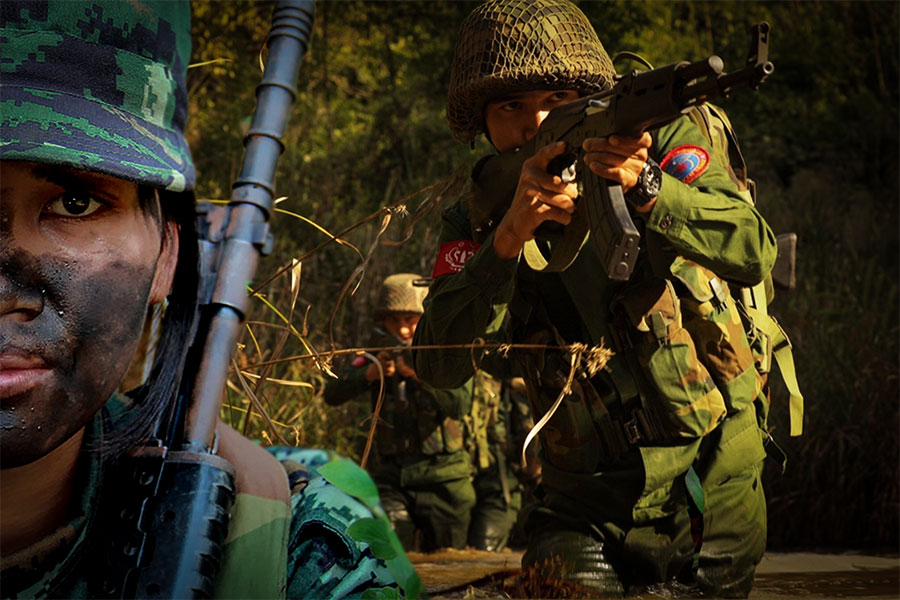
Written by Maung Tun Kyaing
Fighting has been raging in Arakan State since the Arakkha Army (AA) launched an offensive against junta forces on November 13, 2023. AA chief Twan Mrat Naing has said the group will ultimately seize total control of the entirety of the western Myanmar state of Arakan.
“To liberate Arakkha (Arakan) State, we will first take control of the state. We will then implement our political strategies step by step, later, depending on the diplomatic and global situation. We will make decisions by taking everything into account,” AA chief Twan Mrat Naing said when he met AA members on June 16, 2023.
The ongoing hostilities, the third round of sustained fighting since late 2018, have been described as the “final battle” for Arakan State.
Ten Townships Seized by AA
After two months of fighting in Arakan State and Chin State’s Paletwa Township, the AA began to seize towns in early 2024.
In January, it seized Paletwa Township and Pauktaw and Minbya townships in Arakan State. This was followed by the seizure of Kyauktaw, Mrauk-U and Myebon in February, Ponnagyun, Ramree and Rathedaung in March, and Buthidaung in May.
The AA has seized nine townships in Arakan State and Paletwa Township in neighbouring Chin State. It has also seized Taungpyo, Samee, Kanhtaungyi, Tettaung, Maei, Sane, Tan Lwe Ywama, and Lay Taung towns and sub-townships.
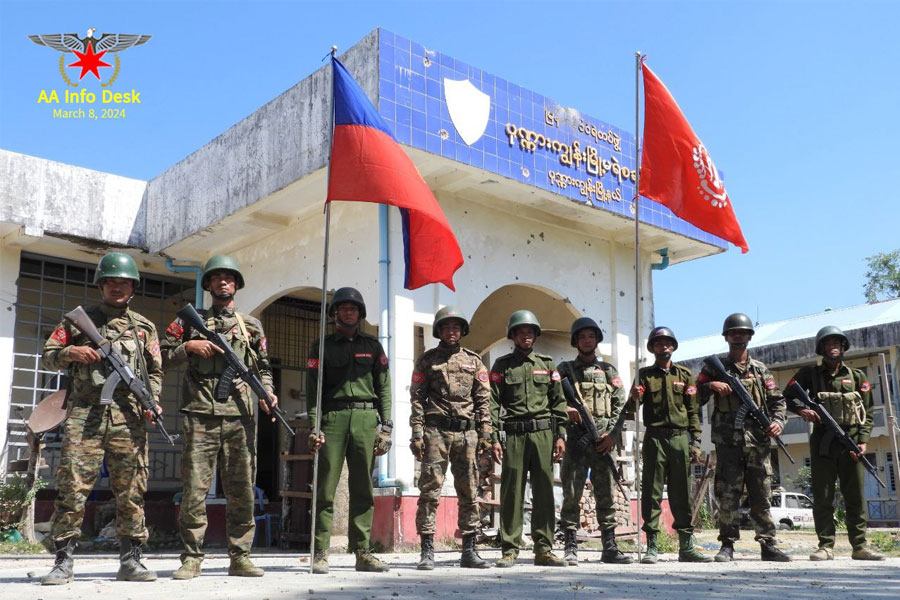
The AA has also announced its planned attacks to seize Maungdaw, Sittwe, Ann, Thandwe, Kyaukphyu, Taungup, Manaung and Gwa townships.
The entirety of northern Arakan State will fall into the hands of the AA once it takes control of Sittwe and Maungdaw. This would give the group control along the border with Bangladesh and India, from Paletwa to Buthidaung and Maungdaw townships.
The AA is attacking junta bases in the border town of Maungdaw and Ann Township in Arakan State, and has surrounded the state capital Sittwe.
Ann is home to the Myanmar military’s Western Command and Light Infantry Battalion Nos. 371, 372 and 373, among other tactical bases. Fighting has been raging in Ann since March 24, with the AA now reaching close enough to shell the Western Command headquarters.
Fighting has been raging in southern Arakan State’s Thandwe Township since April 13. Thandwe is a district-level town and home to the famed Ngapali Beach.
The fighting that erupted on the border of Taungup and Thandwe townships on the Thandwe-Taungup road has spread to the vicinity of the Thahtay Chaung hydropower project and nearby villages, before reaching Got Village just two miles from Ngapali Town earlier this month, close to Light Infantry Battalion No. 566 and Infantry Battalion No. 55.
Property Damage
Despite the AA’s military victories, the state has suffered serious damage as the regime has deliberately targeted residential areas as it has done in other parts of the country.
Eight markets in Ponnagyun, Pauktaw, Minbya, Ramree, Kyaukphyu, Sane and Sittwe were reduced to ashes by junta air and artillery strikes from November 2023 to May 13, 2024, the United League of Arakan (ULA)/AA said on May 13.
A total of 5,976 buildings and infrastructure of various kinds including houses, healthcare facilities, religious buildings, schools, and roads and bridges were damaged or destroyed by the junta’s bombings, shelling and arson attacks in Arakan State and Paletwa Township over the same period, according to the Humanitarian and Development Coordination Office of the ULA/AA said.
A total of 5,849 houses, 19 schools, 13 healthcare facilities, 57 religious buildings (55 monasteries, one mosque, and one church), 26 government offices and 11 roads and bridges were damaged or destroyed during the period, according to the AA.
Light Infantry Battalion No. 539 bombarded Kansauk Village, Kyauktaw Township, on January 13. An entire displacement camp opened at the village monastery was incinerated. The displacement camp had 53 houses, all of which were burnt to the ground.
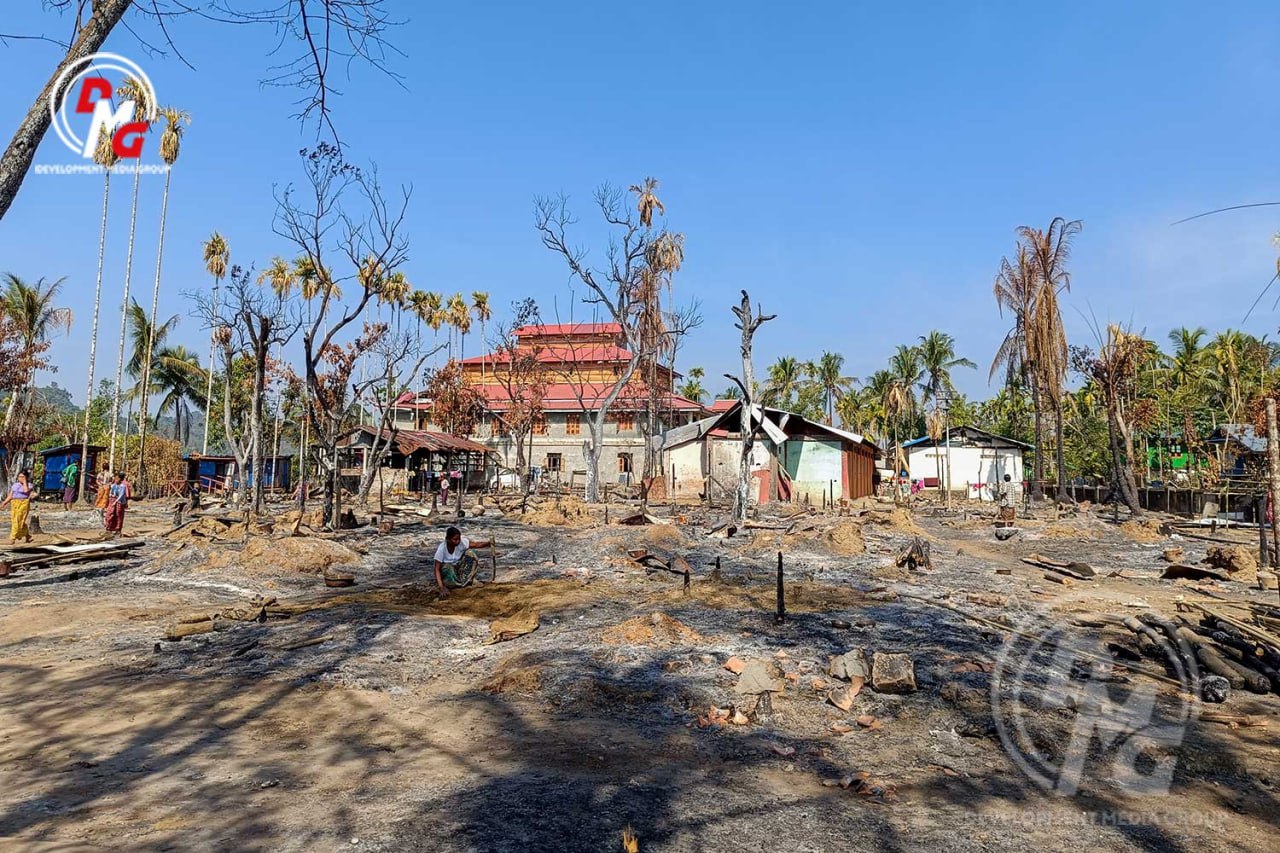
Daw Oo Thar Nu from Kansauk Village said: “The IDP camp caught fire. We were hiding in a bomb shelter. We couldn’t go out as warplanes were also strafing. When we could come out of hiding, we found that the blaze was out of control. We could not take our belongings,”
“There is nothing I won’t dare to do,” military coup leader Min Aung Hlaing once said. And indeed, he ordered a scorched-earth tactic in Arakan State to deter the AA’s assaults. The regime has destroyed more than a dozen roads and bridges across multiple townships in Arakan State to impede the AA’s offensive.
After it lost control of Pauktaw Town, the regime blew up Min Chaung Bridge, a key crossing on the highway to Sittwe.
It destroyed three road sections in Ann, one bridge and a road section in Taungup, one bridge in Ponnagyun, three bridges in Buthidaung and three bridges in Maungdaw.
In the first week of May, it blew up a bridge near Zula Village on the road to Kyee Kan Pyin, which is crucial for road transport in Maungdaw Township.
“The bridge is crucial for villages along the Kyee Kan Pyin road. Junta troops from Border Guard Police Battalion 5 blew up the bridge,” said a local in Maungdaw.
On May 6, the regime destroyed the La Baw Za Bridge on the road from Hla Poe Kaung to Maungdaw. The following day, it destroyed the Thiho Aye Bridge.
One military analyst said: “The regime cut off communications to disrupt the AA’s attacks, and to prevent the AA from supplying its frontline troops.”
In Buthidaung Township, the regime blew up the Pan Zin Chaung Bridge on the Buthidaung-Rathedaung road on May 6, and a bridge linking Bagonenar and Singyi Pyin villages on April 25.
IDPs Surge in Arakan State
During the latest fighting, the number of IDPs increased by more than 290,000, and the total number of IDPs in Arakan State has reached more than 350,000, the Humanitarian and Development Coordination Office (HDCO) said in a statement on May 28. Those numbers have only increased since then. Most of the IDPs are in urgent need of food, shelter, medicines and drinking water.
“We were told to move away. We have nowhere else to go and we still can’t return home. We would like to ask the concerned officials to arrange a land plot for us,” said Daw Cho Cho Aye, an IDP woman from Guwa Village in Ponnagyun Township.
Hundreds of displaced people including Daw Cho Cho Aye’s family are sheltering near Thayet Cho and Yoengu villages, having built makeshift huts on the Sittwe-Yangon road. The IDPs dare not enter Ponnagyun Town as regime forces in Sittwe have often fired mortar shells into the town.
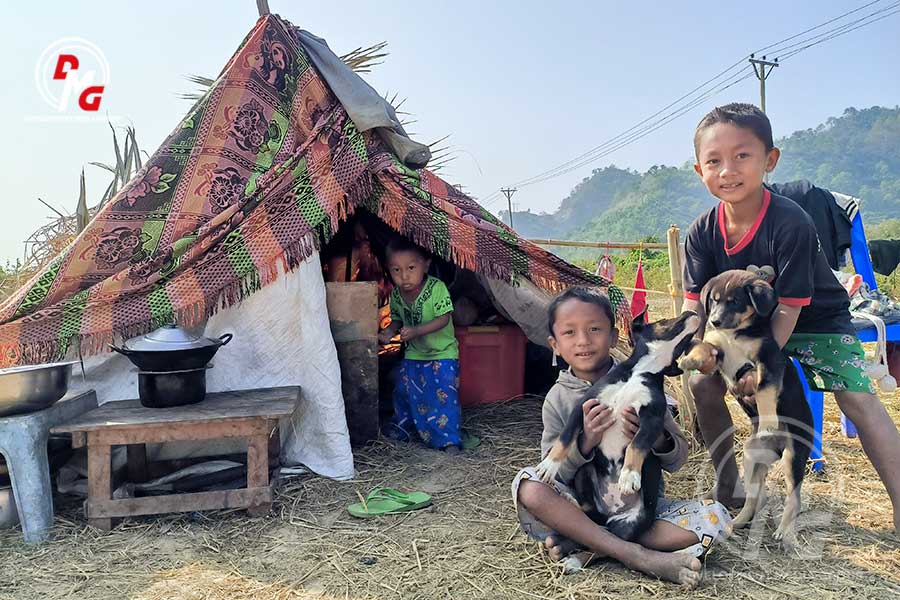
International organisations and local civil society organisations are unable to help those in need freely due to the junta blockades on roads and waterways linking Arakan State.
“I would like to ask the concerned authorities and international organisations to provide what’s necessary for IDPs to spend the rainy season in safe shelter,” said U Zaw Win Naing, an IDP man from Sittwe taking refuge in a “liberated area” under AA control.
Heat waves and seasonal rains are taking a toll on the health of displaced children and elderly persons in particular at displacement camps in Arakan State, with many reported cases of fever, headache and vomiting.
In a statement released by the ULA on May 24, out of the more than 500,000 IDPs in the AA-controlled areas, there are about 200,000 IDPs in Buthidaung and Maungdaw townships, urging international organisations to provide assistance to the IDPs during the rainy season.
Civilians Suffer Most
The regime, which is suffering losses on multiple fronts across the country, is mainly using airstrikes to repel the AA advance — and terrorise civilians. The regime has been carrying out continuous airstrikes on the townships and areas where fighting has been intense since the army and navy have become ineffective.
The regime carries out airstrikes and drone attacks on towns and villages held by the AA in Arakan State on a daily basis.
“Although there is no fighting in our area, we are afraid of the junta airstrikes,” said Daw Nwe Nwe, a local woman in Kyauktaw Township.
The regime conducted 409 aerial attacks in Arakan State in the four months from January 1 to April 30 of this year, according to a report from Nyan Lin Thit, an independent research group monitoring Myanmar’s political situation.
“The regime continues to target the people with airstrikes and artillery attacks. The regime’s strategy is to coerce the people and defeat them. But in doing so, the people have become more resentful of the regime,” said U Pe Than, a veteran Arakanese politician.
A total of 268 civilians died and 640 others were injured at the hands of the regime over the six months from November 13 to May 13, according to the Humanitarian and Development Coordination Office of the United League of Arakan/AA (ULA/AA).
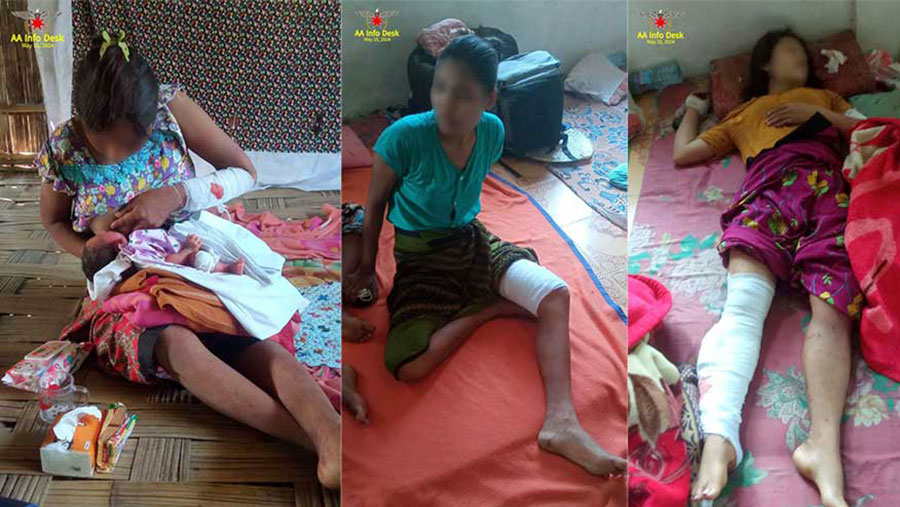
Civilian casualties were caused by junta airstrikes, artillery fire, raids, and landmine blasts, the ULA/AA’s statement said.
The regime also arrested 425 civilians in the six months from November 13 to May 13, the ULA/AA said in a press release on May 28.
Commodity shortages have been reported in Arakan State, with prices skyrocketing since the latest fighting. The regime has blocked off all land and water routes to Arakan State since the military-AA hostilities began on November 13.
Despite the junta blockades, locals in Arakan State are still importing goods for the local food supply, but at a high cost.
India has suspended exports from Lawngtlai District in Mizoram State to Chin State’s Paletwa Township for an indefinite period. The ban was imposed as of the second week of April in response to the food needs of refugees who have fled fighting in Myanmar, causing commodity shortages in Arakan State.
“We can’t buy some goods even if we have money. The commodity prices are skyrocketing significantly,” said a resident of Kyauktaw.
Onion prices have hit K15,000 per viss and garlic prices have soared to K40,000 from K4,000 per viss; dried chilli prices rose to K40,000 from K10,000 per viss, while palm oil for cooking increased to K20,000 from K5,000 per viss. An egg now sells for K1,000.
The number of unemployed in Arakan is increasing as the fighting continues and the banks, which are the main source of money in a cash-reliant economy, have stopped operating, leading to challenges large and small for businesses and local people.
Escalating Racial Strife
A different kind of blow has also come for the AA. After the battle for control of Buthidaung, accusations that the AA was committing human rights violations against Muslims became more prominent.
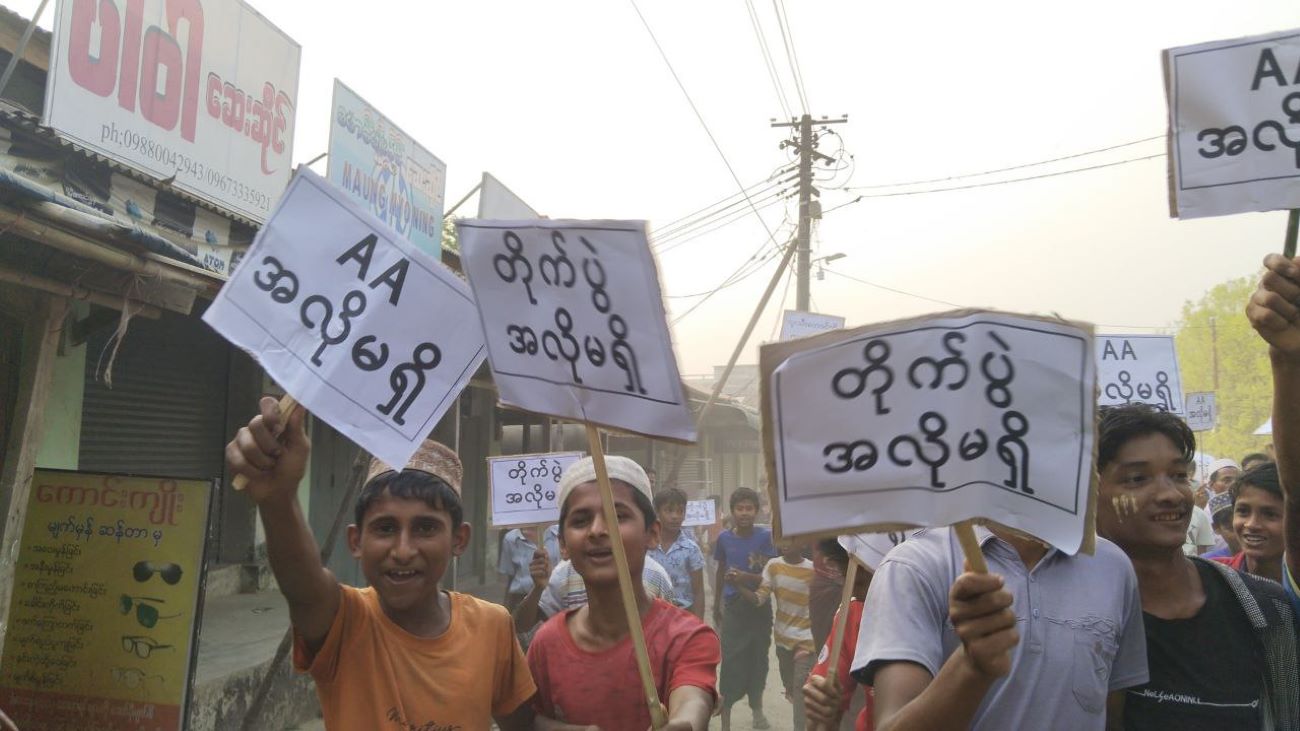
Muslim rights activists, the National Unity Government (NUG) human rights minister, the United Nations and other organisations have given credence to allegations that the AA torched around 5,000 Muslim houses and killed about 100 Muslims in Buthidaung. They have expressed concerns for the affected Muslims, and have urged the AA to reveal the truth about the situation in Buthidaung.
The regime, meanwhile, has been accused of fomenting religious and ethnic conflict in Arakan State as another strategy to weaken the AA.
AA chief Maj-Gen Twan Mrat Naing said the battle for control of Buthidaung was carefully considered.
“We were very careful in the battle for control of Buthidaung. Ethnicity and religion are very sensitive. Internationally, we are more careful because we are working to thwart the regime’s agenda to blacklist the AA,” he added.
Prior to the battle for control of Buthidaung, on May 17, expatriate Muslims accused the AA of burning more than 5,000 Muslim homes, killing hundreds of people and forcibly evicting them from their homes.
AA chief Maj-Gen Twan Mrat Naing said that the AA considers people’s lives as the most important during battle, that there were warnings to evacuate as necessary to protect the public, and there was no burning of Muslim homes.
He said that AA’s civilian safety announcements during the conflict were downplayed by expatriate Muslims and other anti-AA lobbyists, and continued to be misinformation and propaganda.
The regime and military-trained Muslim armed men torched 2,327 homes belonging to Arakanese and Hindu people ahead of the AA’s seizure of Buthidaung on May 17, the ethnic armed group said.
Among the religious buildings burned down by the regime and Muslim armed men were 12 Buddhist monasteries, one mosque, two Hindu temples and two churches, the AA said.
Arakan State’s Future
Myanmar’s military regime has lost dozens of towns across the country to anti-regime forces since the major Operation 1027 offensive was launched in late October in northern Shan State, according to Burma News International (BNI) – Myanmar Peace Monitor.
Some of the most significant victories for anti-regime forces in recent months have taken place in Arakan State, where the AA has officially stated that it would not secede from Myanmar and would remain under a “confederation” political status if its goal of seizing complete control of Arakan State is accomplished.
“The AA is fighting for Arakan State to achieve a political status no less than confederation. We will build a new Arakan State by fighting and asking for what we want,” AA chief Maj-Gen Twan Mrat Naing said in an interview with VOA.
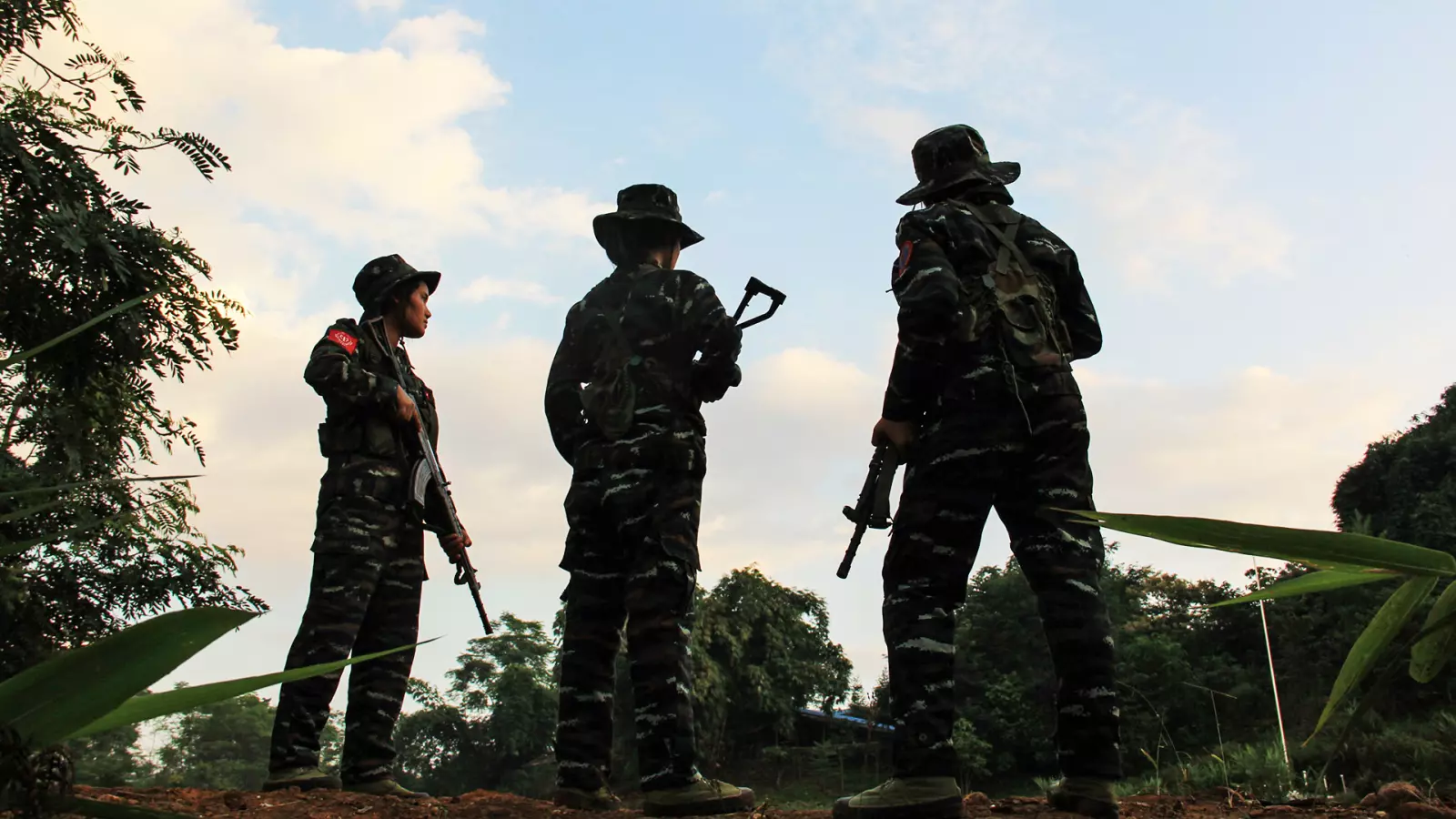
He said that the AA has established good alliance relations with the parallel NUG administration, Chin revolutionary groups, DKBA, TNLA, MNDAA, and resistance forces in central Myanmar.
Twan Mrat Naing recently told AA troops: “We are expecting to gather and celebrate a victory in Arakan State in 2025. We will try to make this a reality by working and proving it.”






.jpg)













